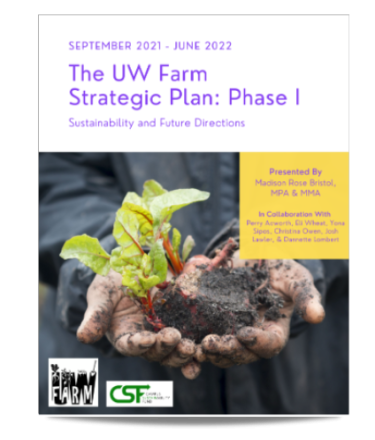Food Systems students partner with UW Farm on winter capstone projects
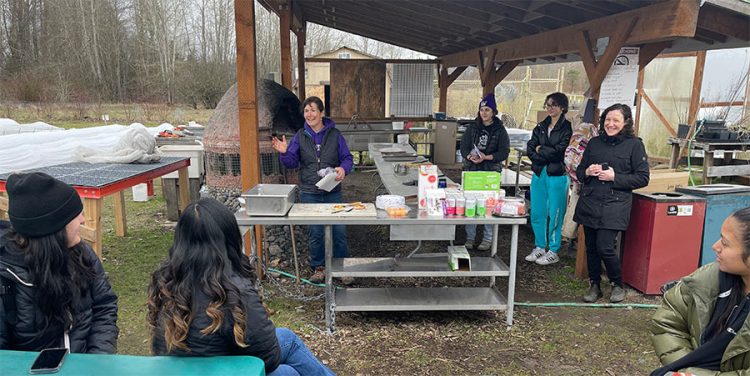
In winter quarter 2023, Food Systems, Nutrition, and Health students from the NUTR 493 Food Systems Capstone course helped the UW Farm take the next step in implementing its strategic planning process that was initiated in 2021.
“An overarching goal given to the students in winter was to gather thoughts, ideas, and recommendations from community stakeholders, increase awareness of the UW Farm’s goals, and to envision the contributing strategies for the organization’s growth,” said Yona Sipos, assistant teaching professor and associate director of undergraduate experiential learning in the Nutritional Sciences Program, and the course instructor.
How Student Teams Collaborated with UW Farm
Students were placed into teams based on their project preferences.
Some teams conducted interviews and focus groups with stakeholders to learn more about ideas, while other teams produced materials the UW Farm could utilize when implementing the four goals from its strategic plan, which are:
- Meet academic demand
- Deepen student understanding of urban food production systems
- Support inclusive community building and empowerment
- Contribute to UW food security, food sovereignty, and sustainability
“The winter capstone invited students to advance the UW Farm Strategic Plan: Phase I through key stakeholder engagement and action planning. Student teams fanned out across campus to think deeply about this shared resource along with partners and advocates,” said Sipos.
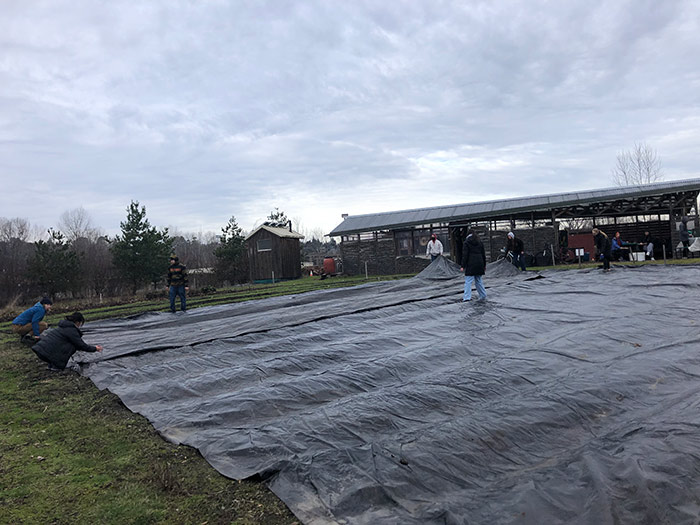
Helping out at the Farm was another component of the course during winter quarter.
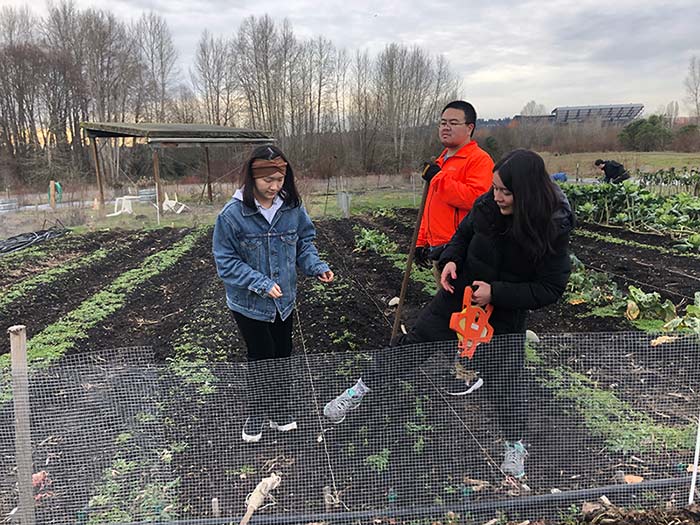
“Students contributed hands-on experiential learning at the Farm to help start seeds, amend soils, scrub tools, and perform other farm tasks to prepare for the upcoming growing season. Engaging students’ multiple learning domains supports their transition from classroom theory to professional practice,” said Sipos.
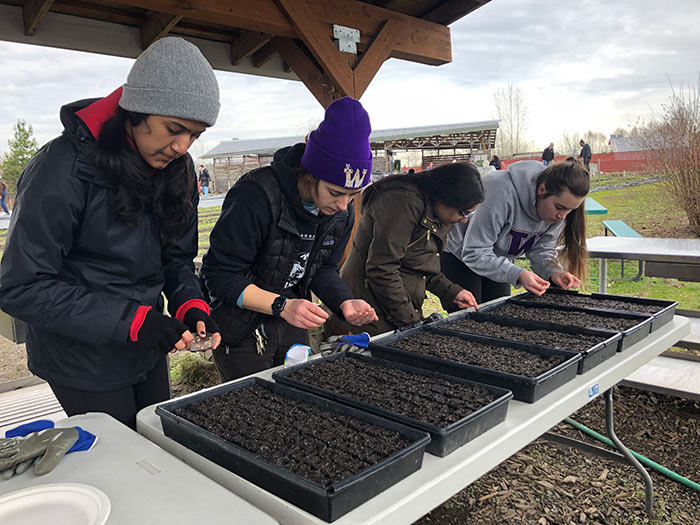
In addition to teaching the Food Systems Capstone course, Sipos also serves as a co-chair of the UW Farm Advisory Committee with Eli Wheat, an assistant teaching professor in the Program on the Environment and core faculty in the Nutritional Sciences Program. Both are also members of the UW Farm Strategic Planning Committee, and Wheat served as a partner in this capstone offering.
2023 Winter Quarter Capstone Projects
View listings of all winter 2023 capstone projects or click the individual project name for details.
| Project Name | Members | Partner(s) |
|---|---|---|
| Ground Truthing Phase 1 of UW Farm Strategic Plan with wǝɫǝbʔaltxʷ - Intellectual House |
Tajanee Chappel, Wen Huei (Vivian) Chen, Rodolfo (Rudy) Franco, Celine Liulamaga, Brenda Leyva Rojas
|
|
| Ground Truthing Phase 1 of UW Farm Strategic Plan with Campus Sustainability Fund (CSF) |
Denise Elizabeth Korompis, Qingqing (Wendy) Zhang, Xi Peng, Dominic Madden
|
|
| Ground Truthing Phase 1 of UW Farm Strategic Plan with RSOs |
Wendy Celaya-Ibanez, Yawen Wei, IsabellaRose Anegbeode, Carmen Wilkinson, Sidney Johnson
|
UW registered student organizations
|
| Ground Truthing Phase 1 of UW Farm Strategic Plan with Farm Advisory Committee (FAC) |
Abdullahi Ahmed, Jheazelle Cadiente, Lily Gridyushko, Heteng Zhang
|
UW Farm Advisory Committee
|
| UW Farm Strategic Goal #1: Meet Academic Demand - Team 1 |
Della Floyd, Ayse Koyun, Lanxuan (Mary) Xu, Yongyi (David) Liu, Li-Ting (Lisa) Chou
|
Josh Lawler, UW School of Environmental and Forest Sciences
|
| UW Farm Strategic Goal #1: Meet Academic Demand - Team 2 |
Corey Maloney, Mckenzie Egan, Phoebe Chen, Renee Hopper
|
Josh Lawler, UW School of Environmental and Forest Sciences
|
| UW Farm Strategic Goal #2: Deepen Student Understanding of Urban Food Production Systems - Team 1 |
Ayn Kurzenhauser, Fnu Danzengquying (Quying Danzeng), Sarah Armbruster, Shixi Zhang, Carson Strange
|
Eli Wheat, UW Program on the Environment and Nutritional Sciences Program
|
| UW Farm Strategic Goal #2: Deepen Student Understanding of Urban Food Productions Systems - Team 2 |
Weiyi (Jeremey) Shi, Xuecheng (Snow) Yu, Cassadey Porter, Taylor Kesselring
*some members not listed
|
Eli Wheat, UW Program on the Environment and Nutritional Sciences Program
|
| UW Farm Strategic Goal #3: Support Inclusive Community Building & Empowerment - Team 1 |
Dawn Dang, Hwi Lin (Kevin) Kim, Qianqi (Kate) Wang, Nathaniel Lesure
|
Cristina Owen, UW Botanic Gardens
|
| UW Farm Strategic Goal #3: Support Inclusive Community Building & Empowerment - Team 2 |
Annete Alcantar, Ariana King, Megha Sonhi
*some members not listed
|
Cristina Owen, UW Botanic Gardens
|
| UW Farm Strategic Goal #4: Contribute to UW Food Security, Food Sovereignty, and Sustainability - Team 1 |
Dana (Cameron) Baker, Kayla Guzman, Hannah Risher, Johnny Nguyen, Zerui (David) Liao |
Alan Trimble and Perry Acworth, UW Farm; Alex Silver, UW Food Pantry
|
| UW Farm Strategic Goal #4: Contribute to UW Food Security, Food Sovereignty, and Sustainability - Team 2 |
Lauren Schwartz, MaKayla Kelby, Makenna Schumacher, Olivia Meader Yetter
|
Alan Trimble and Perry Acworth, UW Farm; Alex Silver, UW Food Pantry |
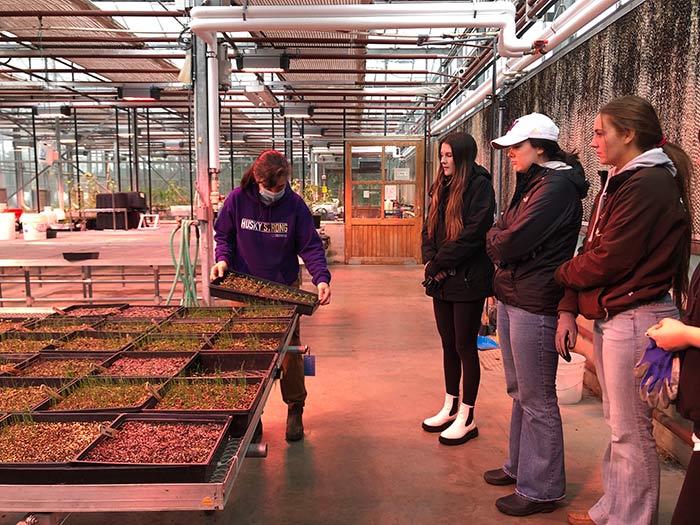
More About the UW Farm
Each year the UW Farm produces over 6 tons of produce for campus dining, the UW Food Pantry, and the campus community. They also foster an awareness of the food system and the idea of a farm as an agro-ecosystem. They are known as a place of innovation and research, somewhere to gain leadership skills, and a destination to access organic fresh vegetables and the potential for a healthier lifestyle.
The 1.5 acre UW Farm, which is part of the UW Botanic Gardens on the UW Seattle Campus, is a student-powered, urban, organic farm and educational facility implementing regenerative farming practices.
Learn more about the Farm’s guiding principles of regenerative farming practices and sustainability in this video produced for Earth Day 2021.
Earth Day at the Farm
The UW Farm will celebrate Earth Day weekend on April 21 and 22 with community activities including releasing ladybugs and planting pollinator flowers and salmonberries. Volunteer experiences are also available throughout the month of April.
Read more about UW Farm Earth Day and spring quarter volunteer opportunities.
Food Systems Capstone: Skills into Practice
All senior students completing capstone projects in the Food Systems, Nutrition, and Health Major are provided with a variety of different projects that allow them to apply the knowledge and skills acquired in their courses to an interdisciplinary and community-based food systems problem or issue.
While students in winter 2023 worked to advance the UW Farm Strategic Plan, student teams working on capstone projects in spring 2023 are focused on supporting sustainable, resilient, and equitable food systems around Seattle and King County, and, in some cases, have state-wide reach.
Past Food Systems capstone projects have focused on themes of food system resilience (2020) and food security, justice, and sovereignty (2021). Project teams also collaborate with different community, government, and/or local businesses each quarter.
Student Reflections
Students captured their individual experiences and personal reflections about their winter projects in a final, end-of-quarter writing activity.
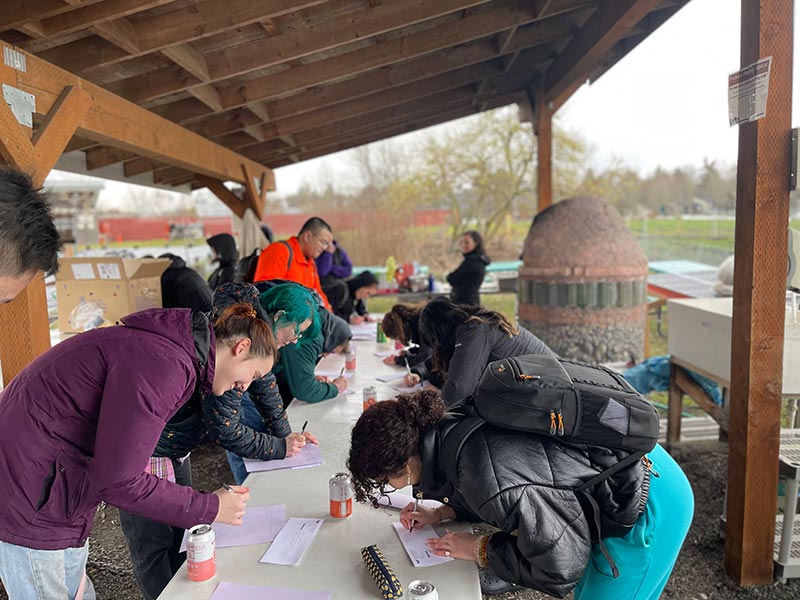
“Conducting [stakeholder] interviews made me realize that so many people want to be involved in the UW Farm and the UW food system as a whole. It was so great to hear that other students not in the Food Systems major were excited about it as a learning opportunity,” remarked one student. “ It also helped me to see how big an impact we students have on other students and groups as a whole. Sparking those ideas in others can go a long way.”
Another student shared, “One big moment for me throughout the quarter was realizing that this major is so much more than learning about how the food system operates, but how our food system impacts our population and planet. This made the project feel so much bigger for me and made me feel like I found a deeper purpose for my professional endeavors in the future.”
Interested in Food Systems, Nutrition, and Health as a major at UW? Learn more here
April 20, 2023
